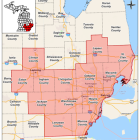
By Rachel Lewis
After the great “moose lifts” in the 1980s, researchers were confident Michigan’s moose population would continue to grow, with a projection that the population could reach numbers in the thousands within 15 years. However, since 2010, the DNR has seen the moose population growth stagnate, with population estimates half of what was expected after the reintroduction. This prompted a collaboration among researchers to look into what’s causing the lack of population growth.

By Rachel Lewis
Boxwood shrubs are popular in Michigan because they add greenery in winter months and deer don’t eat them. They had no predators until 2021, when the box tree moth was discovered in New York. Quarantine areas have grown from 11 to 13 counties in Michigan over the last two years.

By Emilio Perez Ibarguen
Homeowners and environmental groups are pushing for reforms to restrict
wake boats to deeper areas far from shore, aligning Michigan law with existing guidance from the
Department of Natural Resources. A handful of states including Maine, Vermont and Tennessee in recent years have passed laws limiting wakeboarding to specific areas or deeper waters, while a push to do so in Michigan last year was dead in the water in Lansing. Wake boat enthusiasts say they’re being scapegoated for a larger problem.

By Clara Lincolnhol
Michigan experiences hundreds of thousands of lightning strikes each year and ranks 25th in lightning density per square mile, according to data from last year. Lightning strikes in Michigan are on the lower side of the scale because the state gets fewer storms than many others. But the number of people struck by lightning in the state is disproportionately high.
More Headlines




